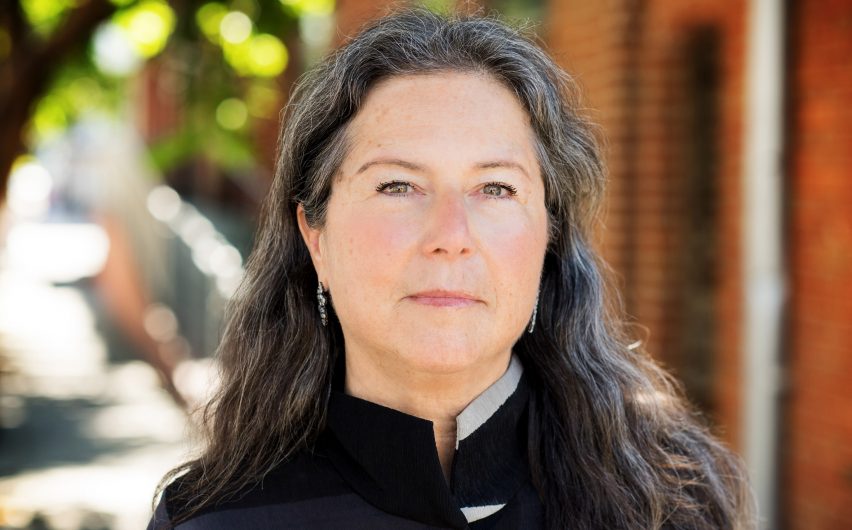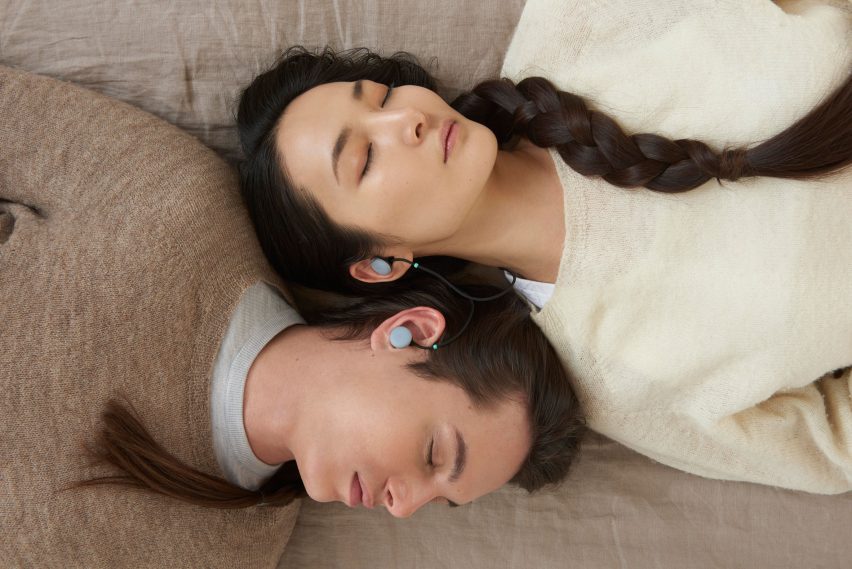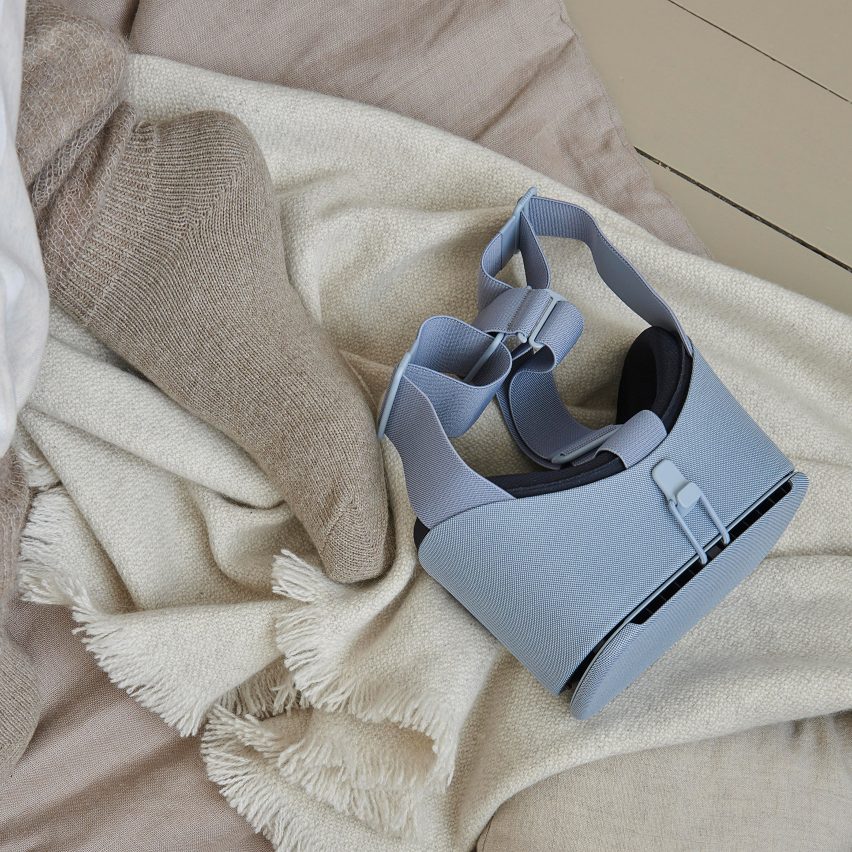
"The tech world is jumping on the design world" says Google's head of hardware design
Technology firms are increasingly looking to designers to help them shape the future and create objects with greater sensory appeal, according to Google's head of hardware design Ivy Ross.
Speaking exclusively to Dezeen following the tech giant's first ever presence at Milan design week last month, Ross said tech companies needed help to better integrate advanced technology into people's lives.
"The tech world is jumping on the design world at the moment because they see opportunities – and not just financial ones," said Ross. "Technology is now here to stay and we've got more comfortable with it."
Ross, who heads Google's industrial design department, said its own modest Milan show was aimed at changing the perception of the company.
"People see us as a search engine and that's all," Ross told Dezeen, adding that Google is "admittedly very late to the game in terms of hardware compared to our competition".
"But by doing this exhibition we are showing how different we are to that, especially in regards to other technology companies."

Called Softwear and held at Spazio Rossana Orlandi, the exhibition explored how digital products could seamlessly integrate with workplaces and homes by adopting the visual language and material palette of interior objects.
Curator Li Edelkoort paired Google products including the fabric-clad Pixel 2 smartphone and Google Home Mini with woven wall hangings from Dutch designer Kiki van Eijk and collections of objects.
"We've definitely shown up to Milan design week in a very different way than people expected," Ross said ahead of a panel discussion hosted in Milan by Dezeen.
"It's a more intimate space than the smoke and mirrors that you'd expect from a tech company. We're more thoughtful than other tech companies in how we are showing the pieces. People are really sensing that too."
Tech brands have shown increasing interest in Milan design week, which was until recently overwhelmingly dedicated to furniture and lighting. This year Google, Instagram and Dassault Systèmes all participated for the first time, joining consumer-electronics brands including Samsung, Panasonic and Sony.
Born in Yonkers in New York state in 1955, Ross started out as a jewellery designer. She joined Google as head of the ill-fated Google Glass in 2014 and moved to run the firm's product design team in 2016.
For her inaugural Milan exhibition, Ross teamed up with her longstanding friend Edelkoort, who is one of the world's foremost trend forecasters.
Based on a trend prediction Edelkoort first made 20 years ago, the Softwear show explored how technology could become more tactile, particularly through the use of textiles and crafted elements, in order to integrate better in people's lives.

This is a key area of exploration for Google, Ross said, as the firm feels that consumers are missing physical experiences in their increasingly digital lives.
"A big technology trend I'm noticing at the moment is that we are craving more sensory experience," Ross said. "In some ways we are numbed to feelings in general and technology is reflecting that. The more time people spend on screens, the more they will want three-dimensionality.
She added: "We are playing with multi-dimensions now. We play with them in our augmented reality and virtual reality worlds, and the big question we're asking at the moment at Google is how does this translate into the physical world?"
This is one of the key issues Ross and her team are trying to address.
"We talk a lot about craft versus technology," she said. "Technology won't eclipse craft. You don't have to make that choice. It would have been easier for us to make black metal boxes that would contain our technology, but that's not what we did. We spent the time overcoming the technical challenges.
She concluded: "I started as a metalsmith. I'm not going to give up craft for technology, and I urge the public not to either."
Below is an edited transcript of the interview:
Emily Wadsworth: So my first question is why did you choose Milan design week to show Google's new product range?
Ivy Ross: People see Google as a search engine and that's all. By doing this exhibition we are showing how different we are to that, especially in regards to other technology companies. We don't need to show off our big black speaker or our big metallic anything.
Emily Wadsworth: What makes you stand out from your competitors, such as Apple and Samsung, in the product space?
Ivy Ross: Google is admittedly very late to the game in terms of hardware compared to our competition. However we've definitely shown up to Milan design week in a very different way than people expected.
It's a more intimate space than the smoke and mirrors that you'd expect from a tech company. We're more thoughtful than other tech companies in how we are showing the pieces. People are really sensing that too.
Emily Wadsworth: This year's Milan design week feels like the year of the tech companies. Why is this?
Ivy Ross: The tech world is jumping on the design world at the moment because they see opportunities - and not just financial ones. Technology is now here to stay and we've got more comfortable with it.
Emily Wadsworth: A question we were asked during our panel discussion with Instagram earlier this week was 'is technology eclipsing craft?' What is your take on this?
Ivy Ross: We talk a lot about this at Google and technology won't eclipse craft. You don't have to make that choice. It would have been easier for us to make black metal boxes that would contain our technology, but that's not what we did.
We spent the time overcoming the technical challenges. I started as a metalsmith; I'm not going to give up craft for technology, and I urge the public not to either. We as a species need to collectively decide not to give up on craft in exchange for technology.
Emily Wadsworth: Are you ever scared by technology or its implications on both humanity and society?
Ivy Ross: I know that some people are fearful of technology, but I'm excited about its possibilities. People are scared of change, but everything is technology in a way. We think of it now as screens, but as humans evolve there are new technologies that offer us new things. I want to reshape people's definitions of technology.
Emily Wadsworth: What were the biggest challenges facing you and your team when creating these products, such as the Google Home Mini?
Ivy Ross: With the Google Home Mini, we couldn't find the material on the market that would fit into the aesthetic we wanted, but also let the sound through. Design can't compromise the functionality of a product at Google, which can be challenging. In the end we created our own new fabric, down to the exact threads.
Emily Wadsworth: What's next for Google products? Can you let us in on some Google secrets?
Ivy Ross: We will expand Google's product range over the years and concepts such smart homes are on our agenda. Ultimately we envisage people living in a home where all the technology connects up together.
Emily Wadsworth: Will we see people living in complete Google-designed homes?
Ivy Ross: Well I don't know if we'd ever go to the extreme of a Google toaster or Google washing machine, but if it makes sense to the user then why not?
Emily Wadsworth: What do you think are the biggest design trends of 2018?
Ivy Ross: A big technology trend I'm noticing at the moment is that we are craving more sensory experience. In some ways we are numbed to feelings in general and technology is reflecting that. The more time people spend on screens, the more they will want three-dimensionality.
We are playing with multi-dimensions now. We play with them in our augmented reality and virtual reality worlds, and the big question we're asking at the moment at Google is how does this translate into the physical world? It's a fascinating time and because of that we are grasping towards a more voluptuous three-dimensional form versus flatness. That's a trend that will continue.